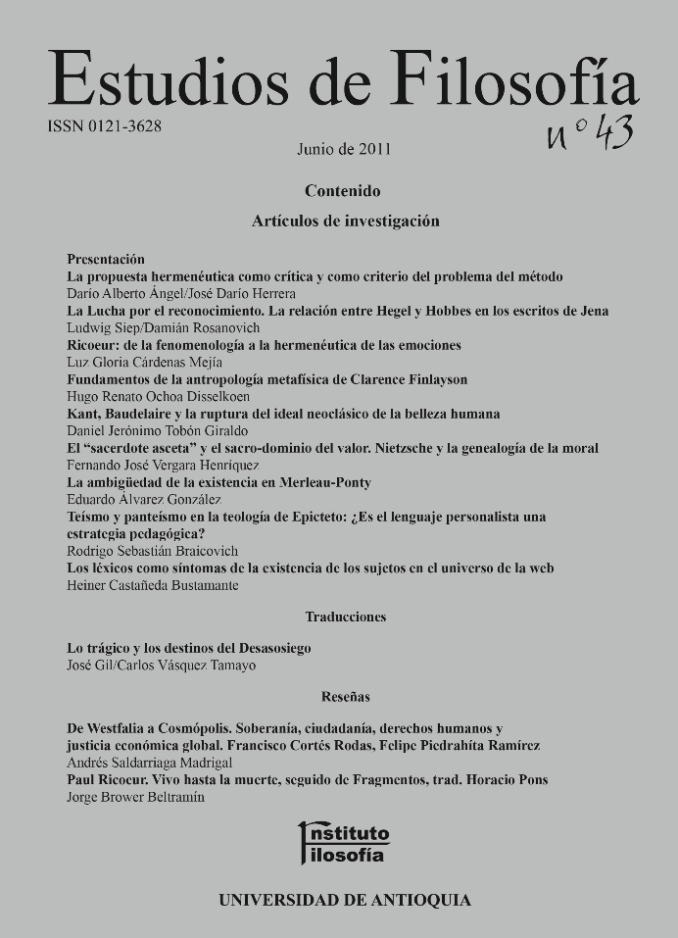Theism and Pantheism in Epictetus’ theology: is the personalist language a pedagogical strategy?
DOI:
https://doi.org/10.17533/udea.ef.11574Keywords:
stoicism, theology, pantheism, personalismAbstract
The goal of the present piece is to analyze the interpretation of Epictetus’ Theology recently put forward by Keimpe Algra, which suggests that we interpret the Personalist Language of certain passages of the Dissertations as a Pedagogical Tool beneath which hides an orthodox core. I will point to some important difficulties in Algra’s interpretation which force us to conclude that the traditional interpretation (that interprets the Personalist Language of the said passages in a literal sense, i.e., as the expression of a Theistic and Personalistic Conception of Divinity) still stands.
Downloads
References
ALGRA, Keimpe. (2007) “Epictetus and Stoic Theology”, en: Mason, Andrew S.; Scaltsas, Theodore, eds. The Philosophy of Epictetus, Oxford, Oxford University Press, pp. 32-55. DOI: https://doi.org/10.1093/acprof:oso/9780199233076.003.0004
ALGRA, Keimpe. (2003) “Stoic Theology”, en: Inwood, Brad, ed. The Cambridge Companion to the Stoics, Cambridge, Cambridge University Press, 2003, pp. 153-178. DOI: https://doi.org/10.1017/CCOL052177005X.007
BALTZLY, Dirk. (2003) “Stoic pantheism”, en: Sophia, vol. 42, no. 2, pp. 3-33. DOI: https://doi.org/10.1007/BF02782397
BONHÖFFER, Adolf Friedrich. (2000) The Ethics of the Stoic Epictetus, Nueva York, Peter Lang.
COLARDEAU, Th. (1903) Étude sur Épictète, París, Albert Fontemoing.
DAVIDSON, William L. (1907) The Stoic Creed, Edinburgo, T. & T. Clark.
DAVIS, Stanley. (1903) Greek and Roman stoicism and some of its disciples. Epictetus, Seneca and Marcus Aurelius, Boston, Herbert B. Turner & Co.
DUHOT, Jean-Joël (2003), Épictète et la sagesse stoïcienne, París, Albin Michel.
EPICTETO. (1993) Disertaciones. Traducción de Paloma Ortíz García, Madrid, Gredos.
GERMAIN, Gabriel. (2006) Épictète et la spiritualité stoïcienne, París, Èditions du Seuil.
HIJMANS, B. L. (1959) Askesis. Notes on Epictetus’ Educational System, Assen, Van Gorkum & Comp.
INWOOD, Brad, ed. (2003) The Cambridge Companion to the Stoics, Cambridge, Cambridge University Press. DOI: https://doi.org/10.1017/CCOL052177005X
INWOOD, Brad. (1996) “L’oikeiosis sociale chez Epictète”. En: Algra, Keimpe; van der Horst, P.; Runia, D. eds. Polyhistor: Studies in the History and Historiography of Ancient Philosophy, Leiden: Brill, pp. 243–264.
JAGU, Armand. (1989) “La morale d’Épictète et le christianisme”, en: ANRW, vol. 2, no. 36.3, pp. 2164-2199. DOI: https://doi.org/10.1515/9783110851526-024
LAGRANGE, M. J. (1912) “La philosophie religieuse d’Épictète et le Christianisme”. En: Revue Biblique Internationale, no. 9, pp. 5-21; 192–212.
LONG, Anthony A. (2002) Epictetus. A Stoic and Socratic Guide to Life, Oxford, Oxford University Press. DOI: https://doi.org/10.1093/0199245568.001.0001
LONG, Anthony A.; Sedley, David, eds. (1987) The Hellenistic Philosophers, Cambridge, Cambridge University Press, 2 vols. DOI: https://doi.org/10.1017/CBO9781139165907
MASON, Andrew S.; Scaltsas, Theodore, eds. (2007) The Philosophy of Epictetus, Oxford, Oxford University Press. DOI: https://doi.org/10.1093/acprof:oso/9780199233076.001.0001
OLDFATHER, W.A. (1961) The Discourses as reported by Arrian, the Manual and Fragments, Cambridge, Harvard University Press.
RODRÍGUEZ MORENO, Inmaculada. (1999) “Demonología estoica”, en: Habis, vol. 30, pp. 175-187.
SEDDON, Keith. (2006) Epictetus’ Handbook and the Tablet of Cebes. Guides to Stoic Living, Nueva York, Routledge. DOI: https://doi.org/10.4324/9780203357002
SEVENSTER, J. N. (1966) “Education or conversion: Epictetus and the Gospels”, en Novum Testamentum, no. 8, pp. 247-262. DOI: https://doi.org/10.1163/156853666X00185
SPALDING, J. L. (1903) Glimpses of truth. With essays on Epictetus and Marcus Aurelius, Chicago, A.C. McClurg & Co.
Downloads
Published
How to Cite
Issue
Section
Categories
License
Copyright (c) 2011 Rodrigo Sebastián Braicovich

This work is licensed under a Creative Commons Attribution-NonCommercial-ShareAlike 4.0 International License.
Authors who publish with this journal agree to the following terms:
1. The Author retains copyright in the Work, where the term "Work" shall include all digital objects that may result in subsequent electronic publication or distribution.
2. Upon acceptance of the Work, the author shall grant to the Publisher the right of first publication of the Work.
3. The Author shall grant to the Publisher a nonexclusive perpetual right and license to publish, archive, and make accessible the Work in whole or in part in all forms of media now or hereafter known under a Creative Commons Attribution-NoCommercia-ShareAlike (CC BY-NC-SA 4.0), or its equivalent, which, for the avoidance of doubt, allows others to copy, distribute, and transmit the Work under the following conditions: (a) Attribution: Other users must attribute the Work in the manner specified by the author as indicated on the journal Web site;(b) Noncommercial: Other users (including Publisher) may not use this Work for commercial purposes;
4. The Author is able to enter into separate, additional contractual arrangements for the nonexclusive distribution of the journal's published version of the Work (e.g., post it to an institutional repository or publish it in a book), as long as there is provided in the document an acknowledgement of its initial publication in this journal;
5. Authors are permitted, and Estudios de Filosofía promotes, to post online the preprint manuscript of the Work in institutional repositories or on their Websites prior to and during the submission process, as it can lead to productive exchanges, as well as earlier and greater citation of published work (see The Effect of Open Access). Any such posting made before acceptance and publication of the Work is expected be updated upon publication to include a reference to the Estudios de Filosofía's assigned URL to the Article and its final published version in Estudios de Filosofía.















